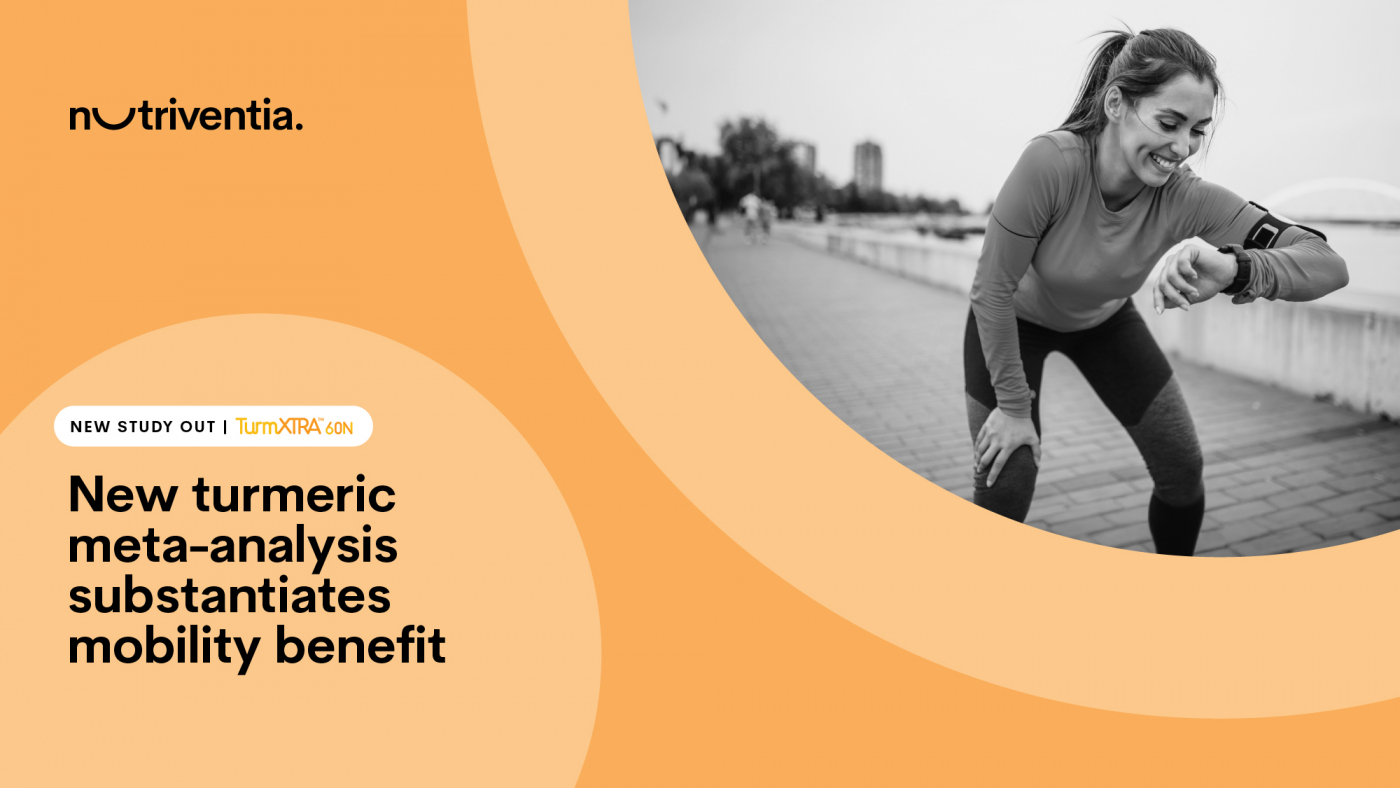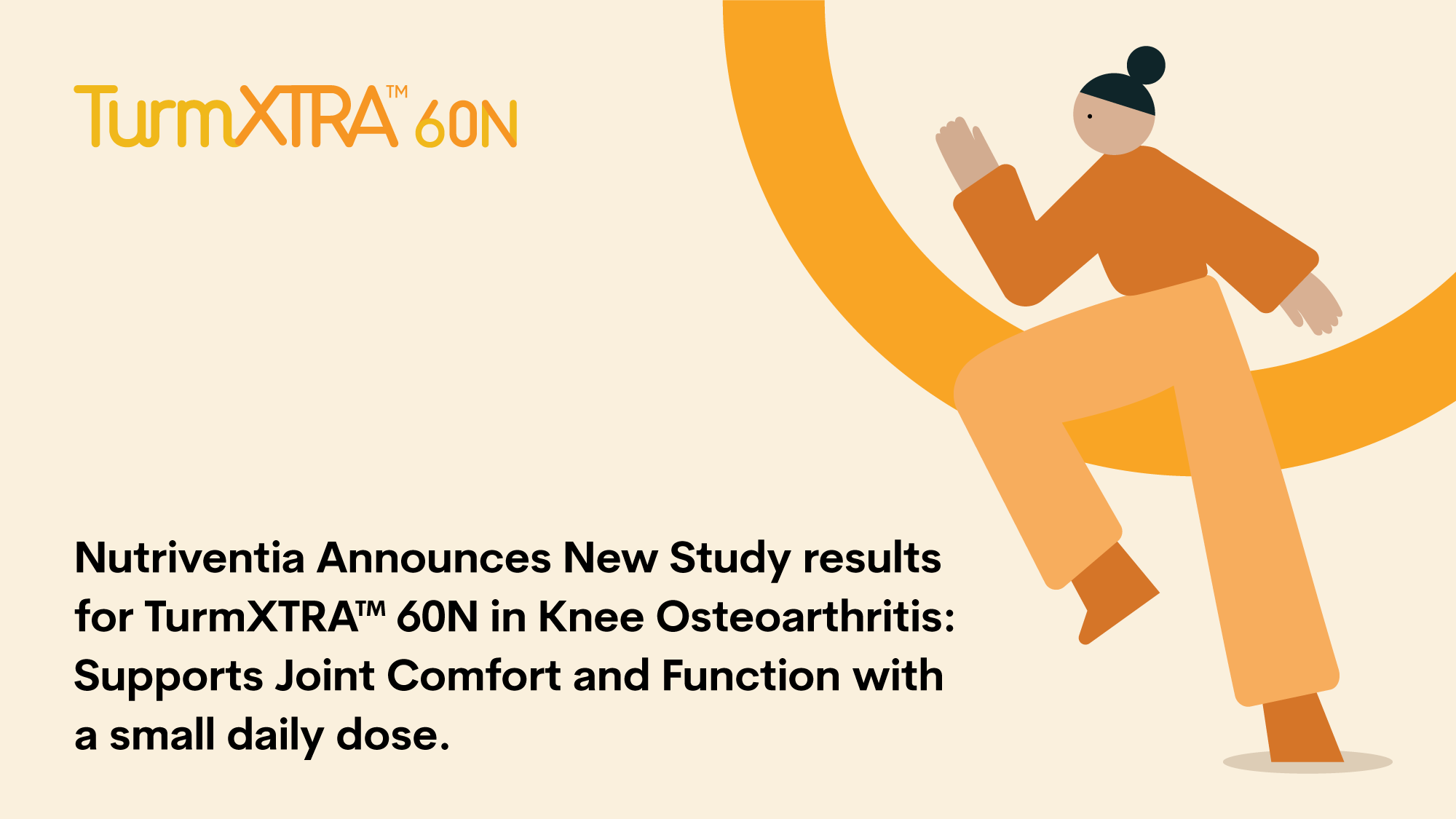A newly published meta-analysis – the study of studies – delves into investigations of how turmeric helps reduce post-exercise muscle soreness as well as joint discomfort; it primarily concludes that turmeric extract (curcumin) supplements can be effective in supporting proper musculoskeletal structure and function.
Turmeric is enjoying the spotlight in many exotic dishes and is easily found in supermarkets and on menus. Turmeric is also shining in supplements, from tablets to gummies to RTD formulas.
Consumers love turmeric – and brands are too. Turmeric has been shown in multiple studies to protect the musculoskeletal system. Musculoskeletal health is characterized by mobility and dexterity as set in motion by muscles, bones, joints, cartilage and connective tissue.
Turmeric (Curcuma longa) contains potent active compounds, curcuminoids (curcumin, demethoxycurcumin, bisdemethoxycurcumin). Previous research has shown that turmeric, when consumed regularly, can act as an anti-microbial, antioxidant, antimutagenic, and notably as an agent that manages inflammatory response.
How Curcumin Protects Mobility
Curcumin has several mechanisms of action. It suppresses activity of inflammatory markers such as cyclooxygenase-2 (COX-2) and 5-lipoxygenase (5-LOX), as well as interleukin-1β (IL-1β), tumor necrosis factor-α (TNF-α), and matrix metalloproteinases (MMPs), all of which can negatively impact musculoskeletal function. Additionally, curcumin can slow degeneration of joint cartilage by protecting IL-1β-induced apoptosis of chondrocytes, supporting joint movement.
Curcumin helps lessen muscle pain and muscle damage, as it reduces lactate dehydrogenase (LDH) secretion, thus promoting faster muscle recovery.
Human Clinical Evidence
The new systematic review and meta-analysis investigated 20 randomized controlled trials (RCTs) with 7 studies related to skeletal muscle health and 13 related to joint health. They included various forms of turmeric extracts, including a natural, water-dispersible turmeric extract, WDTE60N (TurmXTRA™60N). A pharmacokinetic study showed that, when compared to a standardized turmeric extract 95% (STE95), WDTE60N showed higher absorption and comparable exposure for free curcumin, total curcumin and total curcuminoids at a 10-fold lower dose than STE95.
The meta-analyses of curcumin supplementation in both muscle health and joint health are as follows, verbatim from the study.
Muscle Health: For participants aged 18-35 years, who were treated with monotherapy using turmeric extracts and curcumin, pain intensity was assessed using a VAS or a pain intensity point scale. Curcumin was effective and well-tolerated in reducing pain intensity.
The water-dispersible turmeric extract (TurmXTRA™60N) demonstrated significant reductions in pain intensity within 12 hours post exercise, compared to other turmeric extract and curcumin supplements. Thus, the water-dispersible turmeric extract proved to be more effective and safer than other turmeric extracts and curcumin supplements for the management of exercise-related skeletal muscle health.
Joint Health: Adults aged 18 to 80 years were treated with either a monotherapy, a turmeric extract standardized for curcuminoids, or a combination of curcuminoids and a pharmacological treatment. Pain intensity was assessed using VAS, WOMAC, DAS28, JKOM, JOA, KOOS, a numerical rating scale, and ACR, and Lequesne’s Pain Functional Index (LPFI). The studies for both monotherapy and combination therapies concluded that curcumin was effective in reducing pain intensity and improving joint function.
Putting it All Together
Overall, the systematic review and meta-analysis have underscored the viability of incorporating curcumin into supplement regimens to manage post-exercise muscle soreness and joint discomfort through suppression of several pro-inflammation pathways.
Perhaps the key finding is that only 250 mg once daily TurmXTRA™60N was found to be able to substantially alleviate knee pain and improve joint function in healthy participants. Most of the turmeric extract formulations used in the studies reviewed contained approximately 20-40% curcuminoids, but the water-dispersible turmeric extract, WDTE60N, contained 60% natural curcuminoids.
Further, the researchers noted, the randomized, double-blind, placebo-controlled, clinical trials for joint health and post-exercise delayed onset muscle soreness, the water-dispersible turmeric extract showed clinical benefits at the same single daily dose of 250 mg, 150 mg of curcuminoids, as compared to placebo.
The authors concluded that, based on their literature review of RCTs, turmeric/ curcumin supplements have value as a tool to protect healthy musculoskeletal function.
What it Means
Of note, in this meta-analysis, the authors assessed other systematic reviews, which demonstrate how deeply researched turmeric is for musculoskeletal health. They serve as a healthy foundation for the two studies performed on TurmXTRA™60N, detailed in the new meta-analysis.
A meta-analysis is important in nutraceutical ingredient research and development as it provides a clear picture of accuracy to emphasize the ingredient’s ability to perform as claims assert it does. The integrated results of multiple human trials also reveal information such as what doses seem to be the most effective, as well as what range of results can be expected. A meta-analysis can help establish statistical significance – all information that can guide the product formulation team.
TurmXTRA™60N ‘s prominent appearance in such a work clearly demonstrates its superior edge other others. While conclusions of studies on other turmeric studies may be … disjointed, the meta-analysis demonstrates that the research on TurmXTRA™60N is credible and clear.
Read the Meta-Analysis:
Doyle L, Desomayanandam P, Bhuvenendran A, et al. “Safety and Efficacy of Turmeric (Curcuma longa) Extract and Curcumin Supplements in Musculoskeletal Health: A Systematic Review and Meta-Analysis.” Alternative Therapies 2023 Sep. 29(6):12-24



